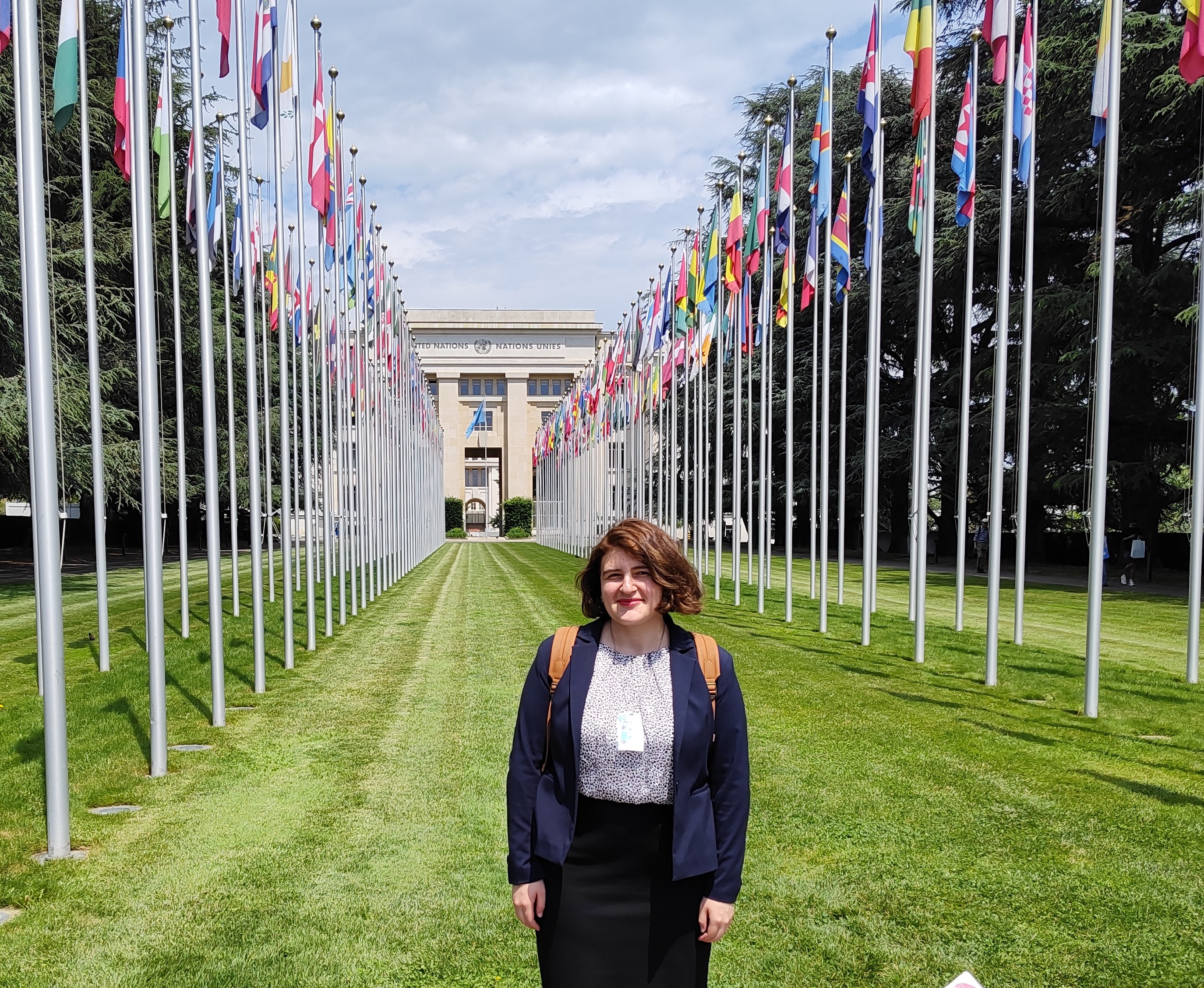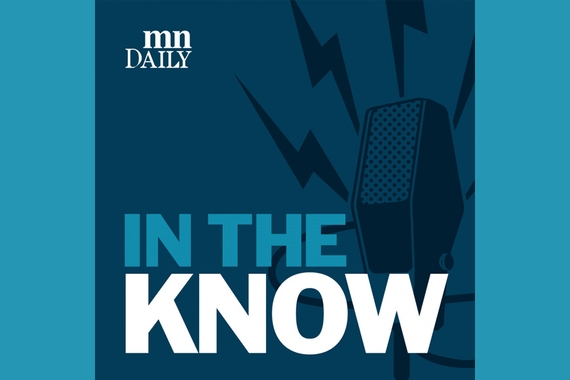Building a Holistic Knowledge Base from Human Rights Work in Various Sectors
The Human Rights Program believes strongly in the importance of integrating professional experience with academic knowledge in the field of human rights, making internships a main requirement of the Master of Human Rights (MHR) degree program. Many students do amazing work with their host organizations and gain valuable field experience to supplement their human rights coursework. In this Q&A series, we interview our students to learn more about their experiences. In our first Q&A of the series, we are joined by Natika Kantaria, a second-year MHR student who interned with the The Office of the High Commissioner for Human Rights.
Human Rights Program (HRP): Can you tell us more about your educational background, specifically at the University of Minnesota. Also, what human rights experience did you have prior to this internship, and what are your substantive interests in human rights?
Natika Kantaria (NK): Last year, I received an email from the U.S. Embassy of Georgia informing me that I had been awarded a Fulbright Scholarship and had been accepted into the joint Master of Human Rights Program offered by the College of Liberal Arts and the Humphrey School of Public Affairs at the University of Minnesota. When I applied for the Fulbright Scholarship, I was seeking an interdisciplinary program that would encompass various aspects of human rights and incorporate diverse perspectives. The MHR program proved to be an ideal match for my aspirations.
Despite my extensive background in Human Rights Advocacy, where I have accumulated over a decade of experience working on projects aimed at promoting the rule of law, human rights, and democracy in my country and abroad, funded by organizations such as the Council of Europe, USAID, Open Society Foundation, National Democratic Institute, European Union, National Endowment for Democracy, and the Swedish International Development Cooperation Agency, the program and its classes provided me with a profound learning experience.
The classes I attended did not solely focus on Civil and Political rights but also placed a significant emphasis on Economic and Social rights. As someone coming from an advocacy background primarily concerned with civil and political rights, this was a pivotal revelation for me. I gained insights into how states and governments perceive Economic and Social rights differently and why these rights often receive insufficient attention, despite the principle of their indivisibility and interdependence, as enshrined in the Universal Declaration of Human Rights.
HRP: Why did you decide to work with the OHCHR?
NK: If someone is aspiring to work in the field of Human Rights, I believe that even a short-term internship with the Office of the High Commissioner for Human Rights (OHCHR) can have a profound impact. The United Nations operates on three core pillars: peace and security, development, and human rights, with the OHCHR serving as the primary UN entity dedicated to human rights. This entity embodies the world's commitment to promoting and safeguarding the full spectrum of human rights and freedoms as outlined in the Universal Declaration of Human Rights.
For me, it was imperative to gain hands-on experience within the OHCHR to better comprehend the specific tasks, challenges, and achievements associated with the protection and advancement of human rights. It serves as a unique vantage point to witness the intricate dynamics between countries, their national priorities, and their efforts to safeguard various rights.
Furthermore, my internship provided me with the opportunity to collaborate with the Development, Economic, Social, and Cultural Rights branch—a focus I had developed during my coursework at the University. The knowledge and practical experience I acquired both at the university and during my time at the OHCHR played a pivotal role in shaping my career trajectory. I have transitioned my focus from civil and political rights to Economic, Social, and Cultural Rights (ESCR), a shift I am deeply committed to pursuing.
HRP: Please describe your role in the organization and some of the major responsibilities you had or projects you completed.

NK: As mentioned earlier, I had the privilege of interning within the Development, Economic, Social, and Cultural Rights branch, specifically within the countering inequalities team. During my three-month internship, with the direct support and guidance of my supervisor I had the opportunity to collaborate with various colleagues within the same branch, each focusing on different topics related to ESCR and the right to development.
Throughout my internship, I undertook several key responsibilities and initiatives, including:
-
Organizing youth engagement sessions: This involved tasks such as reaching out to potential partners, scheduling meetings, creating multimedia content, identifying guest speakers, facilitating content discussions, and moderating sessions. These sessions successfully engaged approximately 200 young individuals in Georgia and Indonesia, with plans for a future session in Brazil.
-
Developing a project proposal for the Fellowship Program: This program aims to promote disability rights on a global scale. I crafted a proposal that covered all essential project components, including budget considerations. The document underwent rounds of refinement through consultations with my supervisors.
-
Creating a communication strategy for the Global Digital Advocacy Campaign: This campaign's objective was to promote ESCR. The communication strategy I developed included key elements, budget planning, an action plan, and specific tasks for a consultancy company. The project secured funding from one of the UN member states, with the preparatory phase scheduled to commence in October.
-
Updating and finalizing various project proposals: I was involved in revising and completing multiple project proposals and had the privilege of engaging in negotiations with UN member states representatives to secure financial support.
-
Developing a tailored concept note: I conceived and developed a concept note tailored to the needs of one of the UN member states, addressing OHCHR activities related to ESCR.
-
Organizing meetings and conducting interviews with UN experts: I facilitated the organization of meetings and participated in the interview process while collaborating on a new project developed by my team.
-
Contributing to the organization and planning of Hernan Santa Cruz Dialogues: This platform fosters the exchange of progressive ideas, experiences, and practices regarding economic and social rights, the right to development, and the 2030 Agenda. It also places a significant emphasis on the Human Rights Economy, a novel approach recently established by the office.
-
Participating in the rollout of the UNESCO - OHCHR Human Rights Economy Chairs: I closely collaborated with my supervisor and economists on this initiative. Additionally, I contributed to the planning and organization of several high-level events in New York and Kathmandu happening during the Fall.
HRP: How does this experience compare to or complement your human rights coursework?
NK: To be honest, after a decade of experience in Human Rights Advocacy, I wasn't certain whether the internship could offer me such a rich and extensive learning experience. However, I couldn't have been more mistaken. Beyond the tasks I performed and the individuals I interacted with, I had the unique opportunity to attend the 53rd Human Rights Council Session. This experience allowed me to witness the entire working process, including discussions, negotiations, decisions made by UN member states, the voting process, and public speeches delivered by permanent representatives. The knowledge and insights I gained from this firsthand experience cannot be attained solely through classroom instruction or reading books and articles. Being physically present in the room provided me with a more profound and comprehensive understanding.
I would also like to highlight a meeting with the U.S. Ambassador to the Human Rights Council, Michelle Taylor, which was organized by my program. This encounter stands out as another significant event during my tenure at the OHCHR. It offered me valuable insights into how the United States engages with the Human Rights Council, its primary areas of focus, and the specific rights it advocates for. The Ambassador's openness and genuine support were truly invaluable, and I deeply appreciate her willingness to share her firsthand experiences.
HRP: How did the internship add to your professional experience and personal growth? How do you see it impacting your career trajectory?
NK: After the internship, I came to the realization that I want to continue my advocacy efforts in the realm of Economic, Social, and Cultural rights while emphasizing the significance of the indivisibility and interdependence of all rights. Additionally, I aspire to expand the geographical scope of my work, extending beyond Eastern European countries to encompass Central, Eastern, and Southern Asia. During my time at the OHCHR, I had the privilege of working on Asia-Pacific issues and collaborating with various stakeholders and field colleagues. Consequently, I envision this as the path I wish to pursue in the future.
I must emphasize the invaluable role played by my supervisor. Her work style and the trust she placed in me allowed me to work independently and acquire a wealth of knowledge while engaging with individuals from diverse backgrounds and organizing various activities. She not only provided me with a voice in every meeting but also highlighted my contributions to the work and its content. Her recognition of my background and experience greatly empowered me.
During my internship, I came to realize that the success of such an experience depends not only on the organization itself but also on the people within it. The role of a supervisor is pivotal, and I was fortunate to be part of a team that collaborates and supports one another, ultimately creating an efficient working environment that fosters motivation and innovation.
HRP: What advice do you have for other MHR students as they decide how to approach their internships?
NK: Begin your internship search now, or at the very least, have a clear idea of where you would like to intern. The application process can be time-consuming, but our school and professors are highly encouraging and supportive. Make use of all available resources and maintain open communication with fellow MHR students, professors, and program coordinators; they are here to assist you.
In addition to these resources, our program also offers internship opportunities. My own internship was part of a joint project between the MHR program and the OHCHR DESIB. Every year, our program issues a call for internship applications and selects one candidate for the position. That's how I secured my internship, and it's worth noting that it is fully funded by our program, which is not the case for the majority of UN interns.
My advice to you is to be bold and courageous in pursuing your goals. Don't hesitate to ask questions, take action promptly instead of postponing tasks for tomorrow, and seize opportunities today.



